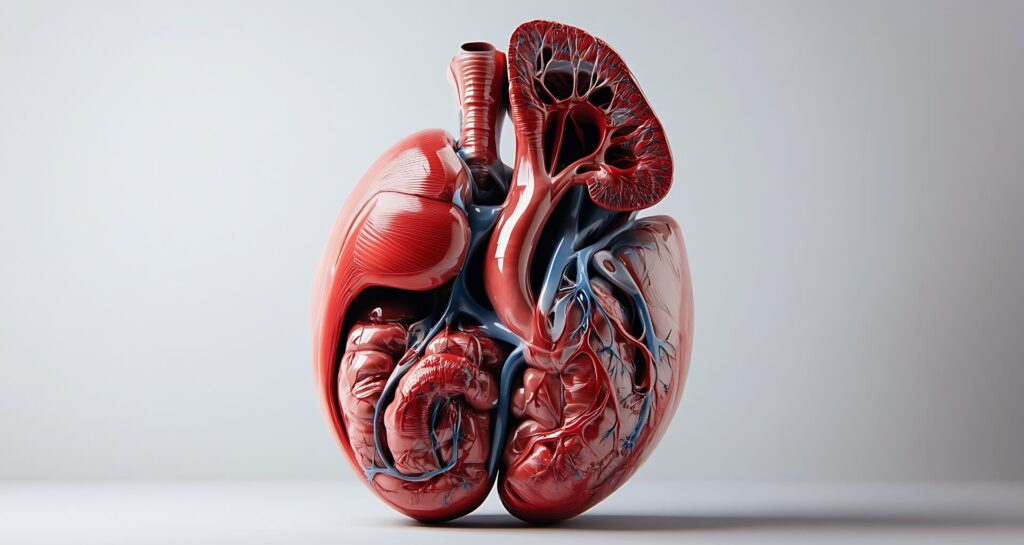Introduction
The coronary calcium score (CCS) is a simple and non-invasive test that can provide critical information about one’s risk for developing cardiovascular disease (CVD). This valuable diagnostic tool allows for early detection and intervention, enabling individuals to take control of their heart health. In this article, we will discuss the significance of CCS, potential scores and their implications, and strategies to address these results through diet, lifestyle, nutrition, and nutraceuticals.
Understanding the Coronary Calcium Score
The CCS measures the amount of calcified plaque in the coronary arteries using a computed tomography (CT) scan. This score reflects the extent of atherosclerosis, or the buildup of plaque in the arteries, which can lead to CVD (Budoff et al., 2020)[1]. The higher the CCS, the higher the risk of developing CVD and suffering a cardiac event, such as a heart attack or stroke.
Interpreting the Scores
The CCS ranges from 0 to over 400, with the scores interpreted as follows:
CCS 0: No calcium deposit
CCS 1-10: Low risk of CVD
CCS 11-99: Mild risk of CVD
CCS 100-399: Moderate risk of CVD
CCS 400+: High risk of CVD (chance of heart attack within a year)
It’s essential to consider age, sex, and ethnicity when interpreting the CCS, as these factors can influence the scores (Blaha et al., 2011)[2].
Strategies for Addressing CCS Results
Diet and Nutrition
A heart-healthy diet is crucial for preventing and managing CVD. Focus on consuming whole, unprocessed foods, such as fruits, vegetables, whole grains, lean proteins, and healthy fats (Estruch et al., 2018)[3]. The Mediterranean diet, which emphasizes plant-based foods, healthy fats, and moderate amounts of fish and poultry, has been shown to reduce CVD risk (Estruch et al., 2018)[3].
Lifestyle Modifications
Physical activity is essential for heart health, with at least 150 minutes of moderate-intensity aerobic exercise per week being recommended (Piercy et al., 2018)[4]. Furthermore, quitting smoking, managing stress, and getting enough sleep can significantly impact CVD risk factors (Steptoe et al., 2018)[5].
Nutritional Supplements
Some nutritional supplements can support heart health, such as omega-3 fatty acids (found in fish oil), which have been shown to lower triglyceride levels and reduce CVD risk (Abdelhamid et al., 2018)[6]. Additionally, vitamin D and magnesium supplementation may benefit cardiovascular health (Judd et al., 2008; Rosique-Esteban et al., 2018)[7,8].
Nutraceuticals
Nutraceuticals are natural products with potential health benefits. Some examples include resveratrol, found in red wine and grapes, which may help lower inflammation and protect against CVD (Novelle et al., 2015)[9], and curcumin, a compound in turmeric, which has been linked to improved endothelial function and reduced CVD risk (Srivastava et al., 2011)[10].
Conclusion
The coronary calcium score is a powerful tool for assessing cardiovascular disease risk. Early intervention, including diet, lifestyle, nutrition, and nutraceuticals, can help address potential issues and promote heart health. Consult with a healthcare professional to determine the best course of action based on your CCS results and overall health.
References
- Budoff, M. J., et al. (2020). Ten year progression of coronary artery, thoracic aorta, and cardiac valve calcification in the Multi-Ethnic Study of Atherosclerosis (MESA). European Heart Journal – Cardiovascular Imaging, 21(5), 532-540.
- Blaha, M. J., et al. (2011). Associations between C-reactive protein, coronary artery calcium, and cardiovascular events: implications for the JUPITER population from MESA, a population-based cohort study. The Lancet, 378(9792), 684-692.
- Estruch, R., et al. (2018). Primary prevention of cardiovascular disease with a Mediterranean diet supplemented with extra-virgin olive oil or nuts. New England Journal of Medicine, 378(25), e34.
- Piercy, K. L., et al. (2018). The Physical Activity Guidelines for Americans. JAMA, 320(19), 2020-2028.
- Steptoe, A., et al. (2018). Healthy lifestyle and life expectancy free of cancer, cardiovascular disease, and type 2 diabetes: prospective cohort study. BMJ, 368, l6669.
- Abdelhamid, A. S., et al. (2018). Omega-3 fatty acids for the primary and secondary prevention of cardiovascular disease. Cochrane Database of Systematic Reviews, 11(11), CD003177.
- Judd, S. E., et al. (2008). Vitamin D deficiency and risk of cardiovascular disease. Circulation, 117(4), 503-511.
- Rosique-Esteban, N., et al. (2018). Dietary magnesium and cardiovascular disease: A review with emphasis in epidemiological studies. Nutrients, 10(2), 168.
- Novelle, M. G., et al. (2015). Resveratrol supplementation, where are we now and where should we go? Ageing Research Reviews, 21, 1-15.
- Srivastava, R. M., et al. (2011). Curcumin has potent anti-amyloidogenic effects for Alzheimer’s ß-amyloid fibrils in vitro. Journal of Alzheimer’s Disease, 24(1), 111-120.
* All information is subject to change. Images may contain models. Individual results are not guaranteed and may vary.

